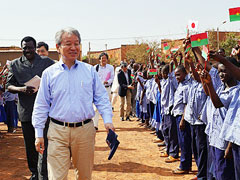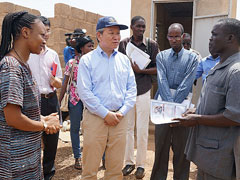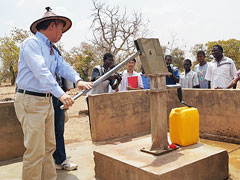On March 10, JICA President Akihiko Tanaka arrived in Burkina Faso, the sixth country he has visited in Sub-Saharan Africa [1] since taking office.
The following day, he visits JICA projects currently underway in the country.
1. While observing an education project aiming at fostering participatory school administration, Tanaka visited an elementary school in the capital of Ouagadougou with Boly Barry, Minister of National Education and Literacy. Parents and guardians of children at the school, who serve on the school management committee, explained how the project has supported the committee's work and improved the children's learning environment. Barry welcomed Tanaka, saying, "Through this cooperation, Burkina Faso and Japan have become family." Tanaka responded "JICA's policy is to continue providing support toward a comprehensive basic education for children who will lead the next generation."

JICA President Tanaka was welcomed at elementary school visits.
2. Next, Tanaka traveled to Ziniaré, located 35 kilometers north of Ouagadougou, where he observed two projects involving water and sanitation. He spoke with pilot farmers participating in a Science and Technology Research Partnership for Sustainable Development that aims to construct a model of wastewater treatment and reuse in the Sahel, [2] where water is precious. He observed how compost toilets have been put into use and saw crop cultivation that utilizes miscellaneous drain water. The ability to cultivate crops in dry season brings for improving the livelihoods of residents. It is reaffirmed how important it is to deliver cooperation directly to people who live in harsh natural environments.
3. Tanaka also visited a project in Ziniaré that aims to use sustainable water through the appropriate maintenance and management of water supply facilities. As many villages in Burkina Faso depend on wells for their water source, the maintenance and management of well pumps are critical for ensuring a stable supply of water. Members of the water users' cooperative that has received project support described their state of maintenance and management, as well as innovations they have made. Tanaka observed how the living standards have risen through the leadership of officials working in the village and the efforts of residents.
During his site visit, Tanaka appealed to the people of Burkina Faso on the importance of building a better society not through international cooperation of one-way flow, but through international cooperation which involves mutual learning processes and strengthen friendships between countries
On March 12, Tanaka will hold talks with President Blaise Compaore on the conditions in the Sahel and concerning the upcoming TICAD V, [3] which will be held in June in Yokohama, Japan. Tanaka is also scheduled to hold talks with Hadjibou Soumare, President of the West African Economic and Monetary Union (known also by its French name Union Economique et Monétaire Ouest Africaine or UEMOA), [4] on promoting regional unification, an important theme in West Africa, and to hold an exchange of opinions with donor countries and international organizations on the support for Burkina Faso.

Tanaka talks with a group of farmers at the project site.

Tanaka tries to pump water.
Notes
[1] Sub-Saharan Africa refers to 48 countries in Africa, all but five in the north. Making up 18 percent of the world's land mass and 12 percent of the world's population with approximately 860 million people, Sub-Saharan Africa has a total GDP accounting for less than 2 percent of the global GDP. The poor in the 47 countries excluding South Africa live on no more than 1.25 dollars per day and are said to number 400 million people or approximately 50 percent of the population.
[2] With no major rivers, the Sahel faces desertification, a serious issue caused by the effects of deforestation and agricultural activities, as well as natural factors such as decreasing rainfall.
[3] TICAD stands for Tokyo International Conference on African Development. Since 1993, the Government of Japan has played a leadership role, collaboratively hosting TICAD with the United Nations, the United Nations Development Program, the World Bank and other organizations.
[4] UEMOA is a regional economic community launched in 1994 by eight West African member countries: Benin, Burkina Faso, Côte d'Ivoire, Guinea-Bissau, Mali, Niger, Senegal and Togo. Headquartered in Ouagadougou, UEMOA has under its supervision the Banque des États de l'Afrique centrale (Bank of the Central African States), which issues the regional common currency the CFA franc, and the Banque centrale des États de l'Afrique de l'Ouest (Central Bank of the West African States). Economic unification is moving forward, and initiatives are being taken to build infrastructure that extends beyond national borders.




scroll